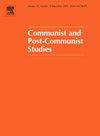Class Analysis as Systemic Critique
IF 1.3
4区 社会学
Q3 INTERNATIONAL RELATIONS
引用次数: 3
Abstract
This article focuses on the role of class analysis in envisioning a better world, in both the past and the present. It critically reflects on class research conducted in the second half of the 20th century in Yugoslavia, and contemporary class research from selected countries of former Yugoslavia, in order to explore the place that class analysis as systemic critique occupied and occupies in a socialist and capitalist context. This approach is informed by Wright’s (2015) evaluation of different forms of class analysis through the game metaphor. According to Wright, whereas Marxist class analysis questions “what game to play,” Weberian class analysis engages with “the rules of the game” and Durkheimian class analysis examines “moves in the game.” Our historical case study of Yugoslav scholarship on class during state socialism illustrates that, despite its role in sanctifying the status quo, class analysis also drew on both Marxism and Weberian inspired life-chances research as tools for systemic critique. On the other hand, our review of post-Yugoslav class research suggests that, currently, class analysis as an instrument for the critique of capitalism is not prominent. Indeed, in contrast to the late Yugoslav period in which sociology engaged class analysis in order to question what game should be played, the post-socialist 1990s and 2000s brought a silencing of Marxist left critique, while sociologists transformed their research into what Wright (2015) would describe as struggles over the rule of the game: problematizing the variety of capitalism that emerged in post-socialism rather than capitalism itself.作为系统批判的阶级分析
这篇文章的重点是阶级分析在过去和现在设想一个更美好的世界中的作用。它批判性地反思了20世纪下半叶在南斯拉夫进行的阶级研究,以及来自前南斯拉夫选定国家的当代阶级研究,以探索阶级分析作为系统批判在社会主义和资本主义背景下所占据和占据的地位。Wright(2015)通过游戏隐喻对不同形式的阶级分析进行了评估。根据赖特的说法,马克思主义的阶级分析质疑的是“玩什么游戏”,而韦伯的阶级分析关注的是“游戏规则”,迪尔凯姆的阶级分析考察的是“游戏中的动作”。我们对国家社会主义时期南斯拉夫阶级研究的历史案例研究表明,尽管阶级分析在美化现状方面发挥了作用,但它也借鉴了马克思主义和韦伯启发的生活机会研究作为系统批判的工具。另一方面,我们对后南斯拉夫阶级研究的回顾表明,目前,阶级分析作为批判资本主义的工具并不突出。的确,在南斯拉夫后期,社会学通过阶级分析来质疑应该玩什么游戏,与此形成鲜明对比的是,后社会主义的20世纪90年代和21世纪初,马克思主义左翼批判趋于沉默,而社会学家将他们的研究转变为赖特(2015)所描述的对游戏规则的斗争:将后社会主义中出现的各种资本主义问题化,而不是资本主义本身。
本文章由计算机程序翻译,如有差异,请以英文原文为准。
求助全文
约1分钟内获得全文
求助全文
来源期刊

Communist and Post-Communist Studies
Multiple-
CiteScore
1.90
自引率
0.00%
发文量
23
期刊介绍:
Communist and Post-Communist Studies is an international journal covering all communist and post-communist states and communist movements, including both their domestic policies and their international relations. It is focused on the analysis of historical as well as current developments in the communist and post-communist world, including ideology, economy and society. It also aims to provide comparative foci on a given subject by inviting comments of a comparative character from scholars specializing in the same subject matter but in different countries.
 求助内容:
求助内容: 应助结果提醒方式:
应助结果提醒方式:


